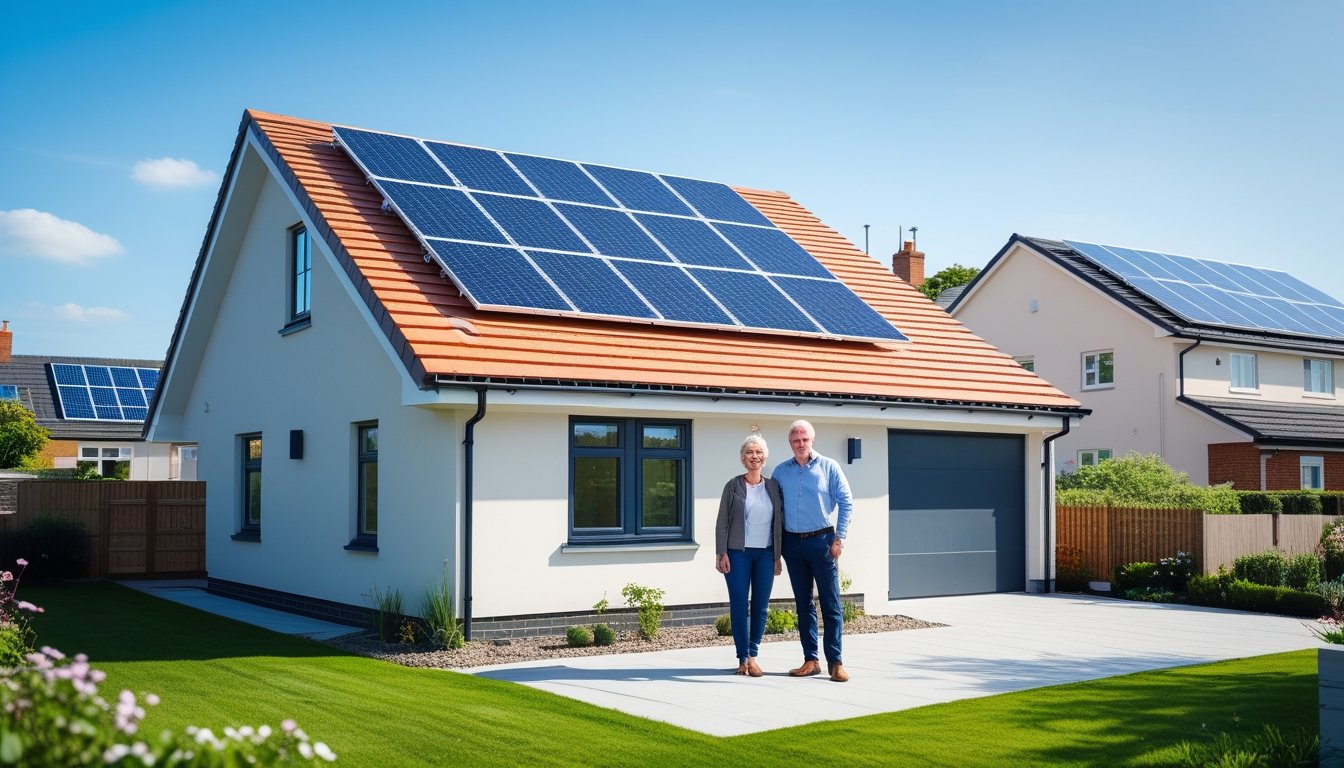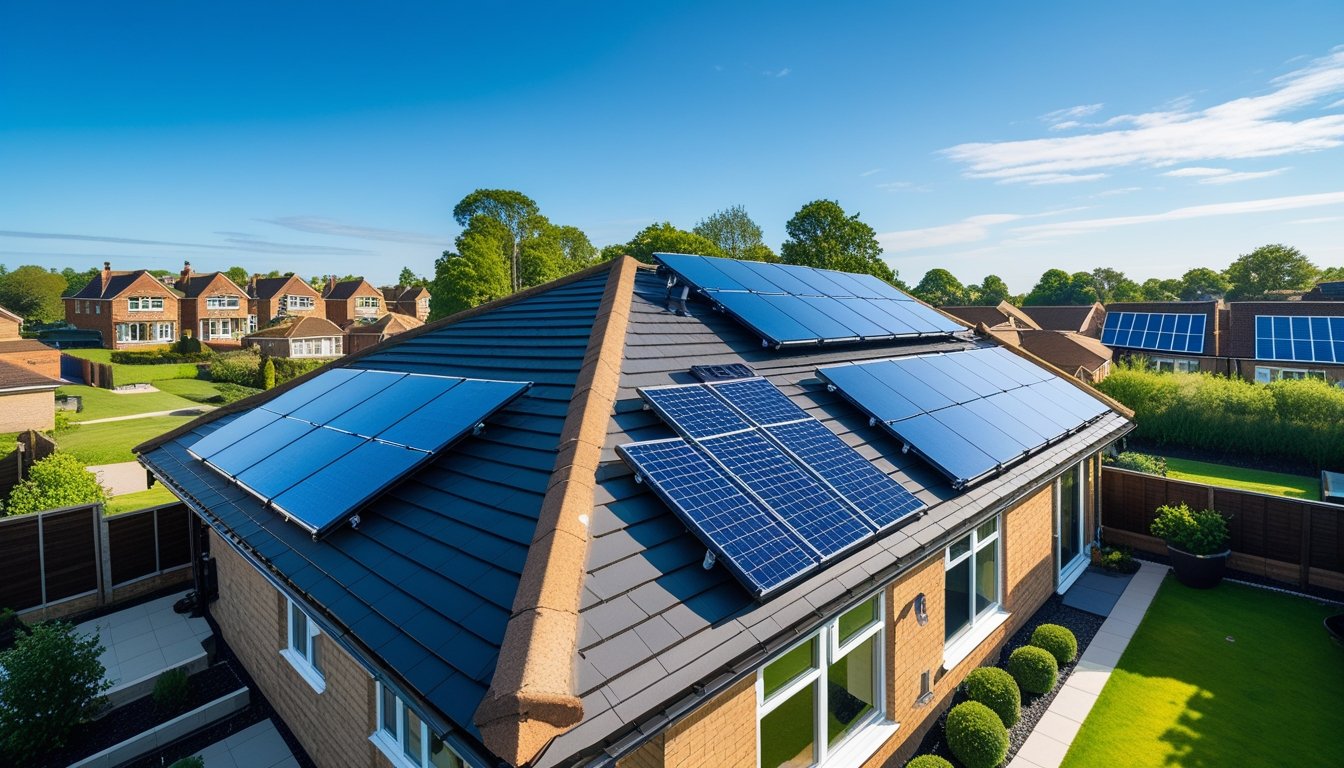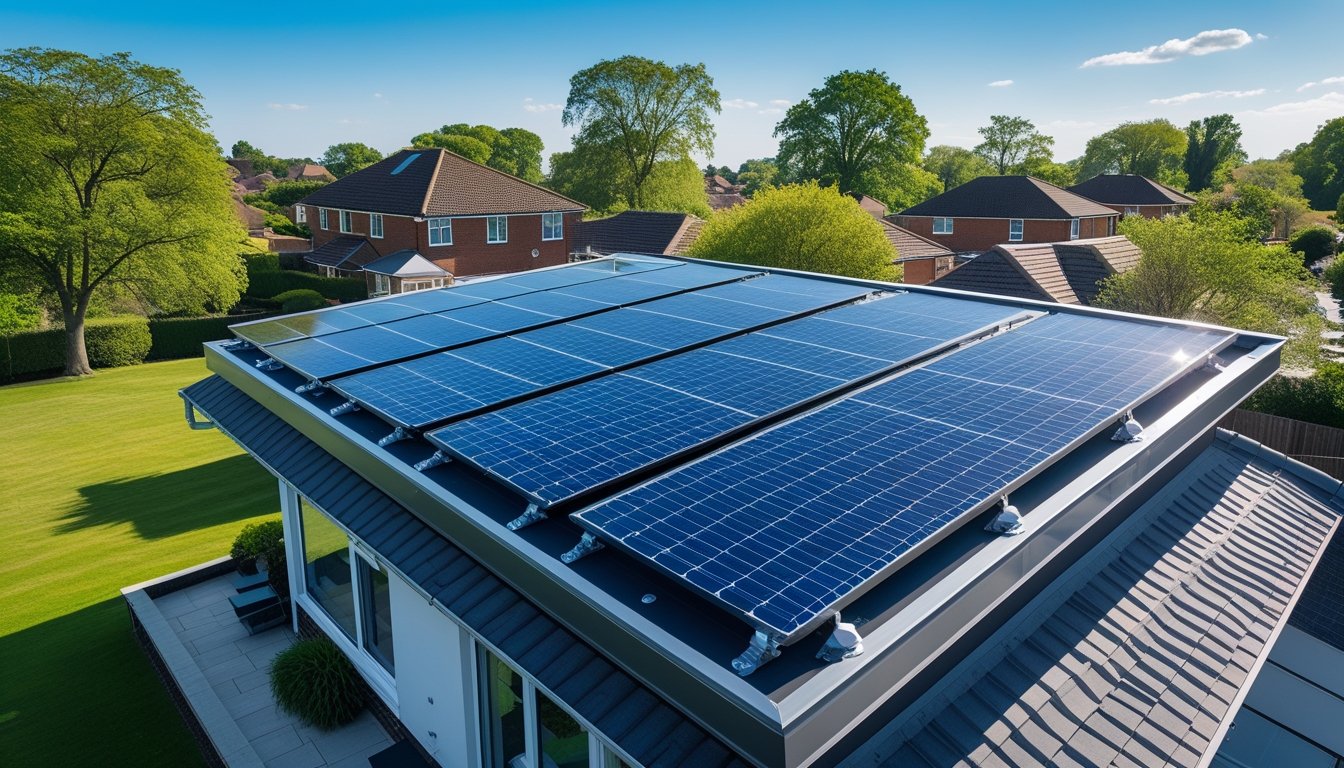Late updated: 07 Sep 2025 14:09
Written by: Oliver Bennett
Innovative Benefits Of Roof Solar Water Heating UK Homes: Revolutionising Energy Efficiency
Roof solar water heating systems, an innovative solution for UK homes, offer both ecological and financial benefits. These systems harness the sun's energy to provide hot water, reducing energy bills and lowering carbon emissions. As we aim to live more sustainably, transitioning to renewable energy sources like solar water heating is key for eco-friendly living without sacrificing comfort.

Our fascination with solar water heating lies in its simplicity and efficiency. Panels or tubes on the roof absorb solar energy, transferring it to heat water for household use. This method optimises energy usage and can yield substantial savings. Homeowners concerned about the environment will find solar heating systems particularly appealing, given their minimal environmental impact compared to conventional heating methods.
Understanding the different types of systems and their installation requirements is crucial. We delve into which homes may benefit most, tackling common questions about initial costs and long-term returns. Addressing these aspects will help readers make informed decisions on integrating solar water heating into their homes.
Key Takeaways
- Harnessing solar power reduces energy bills and emissions.
- Effective for sustainable heating with minimal environmental impact.
- Proper installation and system choice optimise benefits.
Key Benefits And Working Principles Of Roof Solar Water Heating For UK Homes
Roof solar water heating systems are gaining popularity in the UK due to their numerous advantages, from cost savings to environmental benefits. These systems not only provide hot water but also contribute significantly to reducing carbon emissions, making them a smart choice for sustainable living.
How Solar Water Heating Systems Work
Solar water heating systems harness the sun's energy to heat water for domestic use. They employ solar thermal panels, also known as collectors, mounted on rooftops. These panels contain tubes through which a heat-conducting liquid flows, absorbing the sun's thermal energy.
The heated liquid transfers this energy to water stored in a hot water cylinder. Even on cloudy days, the system can generate some heat, though it is typically used alongside a conventional boiler or immersion heater to ensure a consistent hot water supply throughout the year. This integration ensures that our water heating needs are met efficiently through a combination of solar energy and traditional heating methods.
Cost Savings And Financial Incentives
The initial investment in solar water heating systems might seem substantial. However, they lead to significant long-term savings. Installation can help reduce energy bills by providing up to 60% of our yearly hot water needs, primarily from March to September.
In addition, the UK government offers financial incentives such as the Renewable Heat Incentive (RHI), making solar thermal systems more economically attractive. The RHI provides payments for the heat generated from renewable resources, further offsetting installation costs over time. With these savings and incentives, investing in solar water heating becomes a financially sound decision for homeowners.
Environmental Impact And Carbon Reduction
The adoption of solar water heating systems has clear environmental benefits. These systems reduce our reliance on fossil fuels, significantly cutting down carbon emissions. By utilising solar energy for hot water, we contribute to a decrease in greenhouse gases.
The shift towards renewable energy through solar thermal systems is a vital step in combatting climate change. Beyond financial savings, the environmental impact of these systems aligns with global efforts to reduce carbon footprints, promoting a cleaner and more sustainable future for UK homes. Embracing this technology not only benefits individual households but also supports broader environmental goals.
System Types, Suitability, And Installation Considerations

In the UK, the installation of solar water heating systems often revolves around selecting between flat plate collectors and evacuated tube collectors. Considerations such as roof orientation and space can significantly affect the system's efficiency. The volume of hot water usage and the integration of backup systems also play essential roles in shaping the performance potential of these technologies.
Flat Plate Collectors Versus Evacuated Tube Collectors
Flat plate collectors and evacuated tube collectors are the primary types of solar collectors for residential use. Flat plate collectors consist of a dark absorbent plate under a glass cover. They are typically more affordable and efficient in regions with consistent sunlight. In contrast, evacuated tube collectors feature a series of glass tubes with vacuum insulation. This design makes them better suited for colder climates or areas with intermittent sunlight, as they retain heat more effectively. When choosing between the two, we must weigh factors like local weather patterns and space availability, as each system type has its advantages and drawbacks based on these criteria.
Roof Orientation And Space Requirements
The orientation and angle of our roofs are critical for maximising solar water heating performance. Ideally, a south-facing roof offers the best exposure for solar panels, including both solar water heating systems and photovoltaic panels. However, east or west-facing roofs can still yield sufficient results, though possibly with diminished efficiency.
Space requirements also vary between system types. Evacuated tube collectors generally need less surface area than flat plate collectors due to their efficiency. Roof strength and structural conditions should also be assessed to support the weight and installation of these solar collectors, ensuring they can withstand both the collectors and any potential environmental stress.
Hot Water Usage And Backup Systems
Understanding our household hot water usage helps in tailoring the solar water heating system to fit our needs perfectly. Larger households with high water demand might require more extensive systems or multiple collectors. Conversely, smaller households can benefit from fewer panels. Even the most efficient solar heating systems can't solely meet all hot water needs year-round, especially during winter months.
That's why integrating a backup system, such as traditional boilers or heat pumps, is crucial. These systems ensure there is always available hot water, regardless of solar input variations, thus providing reliability and comfort for our homes.
Frequently Asked Questions

In our exploration of solar water heating for UK homes, key questions often arise surrounding installation costs, system integration, lifespan, weather impacts, and environmental benefits. Addressing these can guide homeowners in making informed decisions.
What are the expected costs involved in installing a solar water heating system in the UK?
The initial investment for solar water heating systems varies from £3,000 to £5,000. This cost covers installation and equipment, including panels and a new or modified cylinder. Government grants and incentives can sometimes offset these expenses, making it a more attractive financial option for many households.
How do solar thermal panels for domestic water heating work?
Solar thermal panels capture sunlight, converting solar energy into heat for water in a storage cylinder. They operate most efficiently when installed on a south-facing roof but can still function on east or west-facing roofs. By using them, homeowners can significantly reduce their reliance on gas or electricity for heating water.
Can solar water heating systems be integrated into existing UK home heating setups?
Yes, we can integrate solar water heating systems into most existing heating setups. The integration requires a compatible cylinder with a solar coil, but beyond that, minimal modifications are needed. It allows us to continue using our primary heating system while benefiting from solar-heated water, providing flexibility and efficiency.
What is the typical lifespan of a solar water heating system in a UK household?
Solar water heating systems generally have a lifespan of 20 to 25 years. Regular maintenance, like inspecting panels and pipes and ensuring there are no leaks, can help extend their operational life. The durability and longevity often make them a worthwhile investment for long-term home efficiency.
How do weather conditions in the UK affect the efficiency of solar water heating systems?
In the UK, solar water heating efficiency can be influenced by weather patterns. Systems are designed to work even in indirect sunlight, common with the UK's cloudier conditions. While efficiency may decrease slightly during winter, they are still a reliable and sustainable option for providing a substantial portion of hot water needs year-round.
What are the environmental benefits of using solar water heating in UK homes?
Utilising solar water heating reduces reliance on fossil fuels, cutting down on carbon emissions and energy costs. By harnessing renewable energy from the sun, we contribute positively to environmental preservation. This approach aligns with goals for sustainability and reducing our collective carbon footprint, promoting cleaner, greener living spaces.
